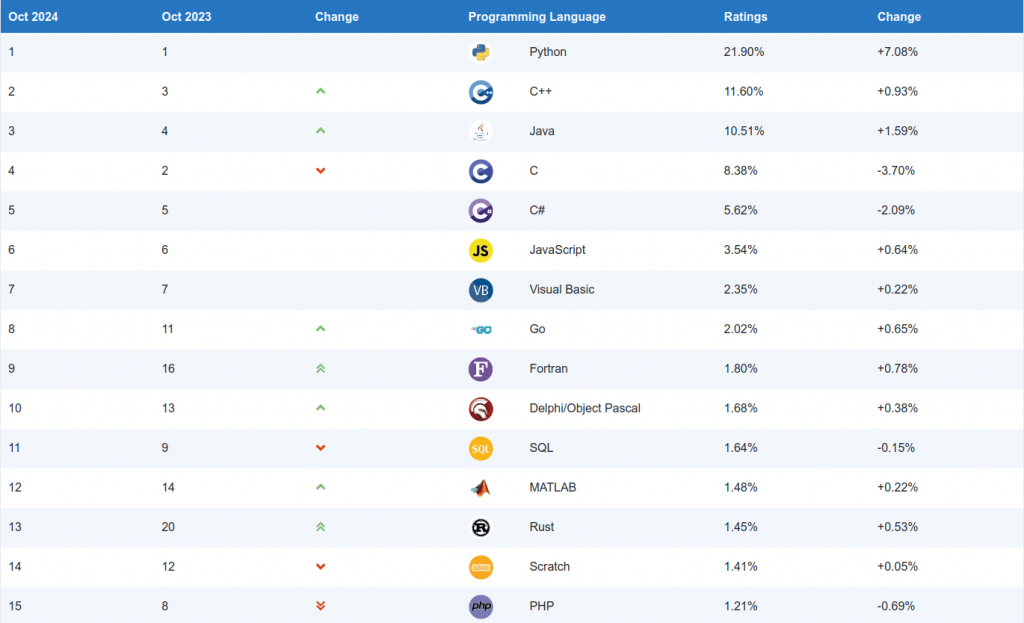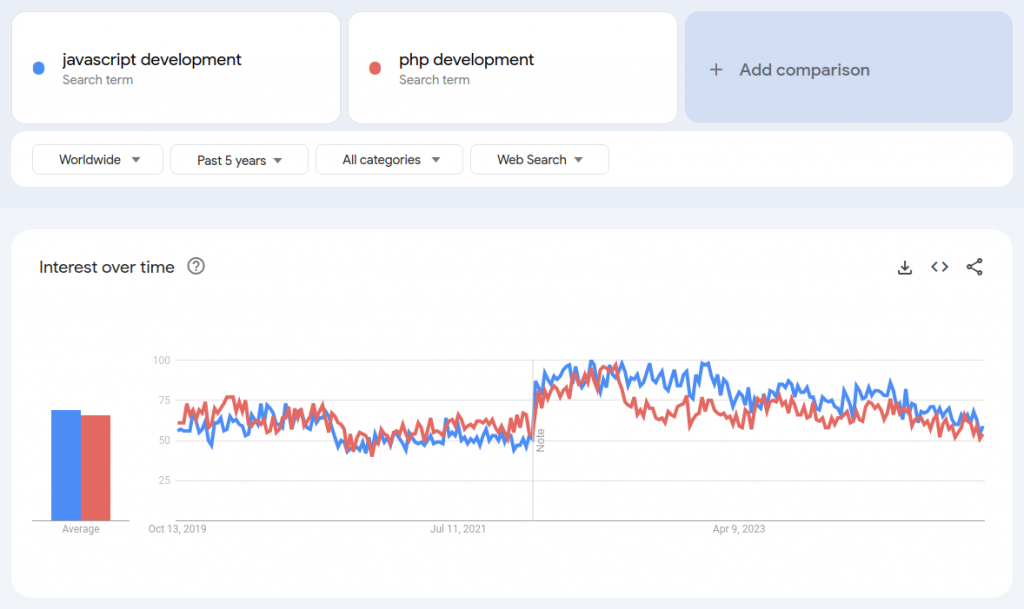The Great Comeback of PHP: Uncovering the Reasons for Its Newfound Popularity
It may seem that in the world of software development, everything always moves forward. New languages, frameworks, and libraries, from time to time, change the paradigm of how things are done and sweep the favorites from their pedestals. However, sometimes, we witness a blast from the past that brings back a decade-old tech and all of a sudden, everybody loves it. That’s precisely what happened to PHP lately. In the era where everybody’s talking about when it comes to backend development is Python and Go, PHP has become popular again. In this article, we’ll try to figure out why.
The Rise and Fall of PHP's Popularity
First, let’s consider the major reasons for PHP's popularity and see how things have changed over the years.
Why PHP Became Everyone’s Favorite Language
Ease of use. PHP development is relatively easy to learn, even for beginners, thanks to its straightforward syntax. This programming language’s flexibility with HTML and various databases like MySQL, PostgreSQL, and SQLite is relentless.
It’s open source, which makes this programming language free to use. A large community supporting it offers libraries and frameworks, such as Laravel or Symfony, that can be integrated seamlessly.
Read Also Open-Source Software vs. Proprietary Software: Being in Two Minds While Weighing All Pros and Cons
PHP offers high performance. PHP can handle a large amount of data and traffic efficiently making it suitable for high-traffic websites.
Strong community support resulted in plenty of resources, tutorials, and forums helpful for troubleshooting and learning. The community also contributed to a rich ecosystem of tools and extensions.
Versatility. PHP is highly versatile and can be used for various types of web applications, from simple websites to complex enterprise-level applications. It integrates well with other technologies and services, making it a flexible choice for developers.
How PHP Started Losing Its Popularity
Despite being such an attractive programming language, according to many rankings, PHP has lost a lion’s share of its popularity over recent years. Here and there, you can see signs signaling about it. For example, the TIOBE Programming Community Index shows that from October 2023 to October 2024, PHP fell from 8th to 15th place:

There are multiple reasons for that, for example:
Innovations in web development. The web development industry is an arena of fierce competition. Here, you can witness the rise of new technologies that decrease the prevalence of already existing ones. For example, the Node.js development enables coders to use JavaScript both for the backend and frontend parts of the app, which at least reduces the need to use one additional language;
Stereotypes were formed around this language over the long years of its existence. For example, its comparative performance restricts some developers from using it. However, it has improved regarding this aspect in versions 7 and 8;
Low presence in new areas. While PHP has maintained its stronghold in web development, other languages have quickly capitalized on emerging technological trends. For instance, Python's extensive libraries for machine learning have established it as a frontrunner in the AI space. Consequently, programming languages closely tied to innovative technologies such as AI development, data science, and IoT have garnered significant attention, somewhat eclipsing PHP's presence in these areas.
Read Also AI at Your Service. How to Build an AI Assistant in 9 Steps (feat. DHTMLX ChatBot)
However, PHP just refuses to die and become a part of history. It has its ups and downs, and in general, is losing the race for programmers' attention. However, Google Trends shows there’s no major drop in PHP significance. Moreover, lately, it received an influx of attention generated by both industry trends in general and the efforts of PHP developers.

Why People Return to PHP Today
Tech Companies Tend to Cut Costs
As you've probably heard, the tech sector has slowed down. There are a few layoffs here, some layoffs there, and ultimately, layoffs everywhere. Once bloated, tech companies need to have the job done and can’t afford 10 developers, while six of them do not know anything and are just fattening out their resumés trying to build code here. People have got to start looking at getting projects at a reasonable cost and delivering performances for small and medium businesses. We're talking about guys who need a website. We're talking about an efficient project or MVP development, and you cannot build languages that are so full of complexity now. And PHP is what gets the job done.
Another trend that moves programming towards PHP is that there are more and more discussions about how cloud services such as Azure or AWS are, in fact, needed only by large corporations. Suppose you have a small-to-middle product. You can build it with a small, cheap VPS, an on-premise server, or even a computer in your office. Since this is a very simple solution, then the product that you write on this simple server must also be launched simply. And what could be more straightforward than just installing Apache or NGINX and launching some PHP on it? Nothing. It can be done pretty quickly and everything will work great. Therefore, these aspects also encourage many people to look towards PHP.
The chances that PHP will replace Python, Go, or Java in the enterprise are pretty low. However, for many people today PHP is becoming a programming language that allows them to easily enter into web development, build relatively simple products, and start making money. Just like in JavaScript, it allows you to write the code the way you want, e.g. with types or without types, following the functional programming paradigm, and so on.
Read Also How to Train Your PHP Skills. Projects And Libraries With Open Source Code
The Evolution of PHP: A New Era of Performance and Productivity
PHP has undergone significant transformations in recent years, with the introduction of PHP 8 and subsequent versions, which have brought numerous modern features that enhance the language's performance, security, and usability. Key highlights include:
Just-In-Time (JIT) compilation, which accelerates code execution by converting it into machine code at runtime, leading to substantial performance gains;
Enhanced typing features, such as union types and named arguments, which improve code predictability and maintainability, bridging the gap with more statically-typed languages;
Attributes, which enable developers to add metadata to classes and methods, further empowering frameworks like Symfony and Laravel;
PHP speeds up with each update — and it speeds up significantly. You can check some benchmarks yourself.
These advancements have elevated PHP to a more prominent position in modern web development, making it an attractive choice for developers.
Laravel: The Driving Force Behind PHP's Resurgence
Laravel, the most popular PHP framework, has been instrumental in revitalizing PHP's ecosystem. Its appeal lies in its:
Clean and intuitive syntax;
Integrated tools for routing, authentication, and database management;
A comprehensive library of packages for extending functionality;
A thriving community that continually pushes the boundaries of PHP's capabilities.
Laravel's influence has been profound, attracting developers who may have otherwise overlooked PHP. With each new version, Laravel continues to draw in both newcomers and experienced developers alike. Not so long ago, Laravel received a solid investment. We’re not talking about hundreds of thousands or even millions of dollars. We’re talking about an incredible 57 million dollars.
Beyond Laravel: There’s Everything You Need
Due to the large PHP lifetime, almost every tool you can dream of is available on the market. Think of a library with a specific feature set. Over all these years, it has most likely already been written and time-tested. The broader PHP ecosystem is undergoing a significant transformation, with numerous new high-quality open-source projects emerging. Composer, PHP's package manager, provides access to thousands of libraries and tools, making it an essential component of modern PHP development. New tools like RoadRunner and PHP-FPM have redefined how PHP applications are deployed and run, bringing the language closer to the performance and scalability of languages like Go or Node.js.
PHP Remains the Web's Backbone
Despite the rise of newer languages, PHP remains the foundation of the web, powering more than 75% of websites, according to W3Techs. Its vast install base, coupled with its familiarity, reliability, and extensive community support, ensures continued investment in the language. Popular content management systems like WordPress, Joomla, and Drupal, which power over a third of the world's websites, are built on PHP, cementing its presence in the digital landscape.
Read Also PHP Development Benefits For Business
Where PHP Shines
Web Development. PHP remains a dominant force in building dynamic websites and web applications. Its ease of use, flexibility, and strong community support make it a go-to choice for many developers.
Content Management Systems (CMS). Popular CMS platforms like WordPress, Joomla, and Drupal are built on PHP. These platforms power a significant portion of the web, making PHP essential for creating and managing content-rich websites.
E-commerce. PHP is extensively used in developing e-commerce platforms such as Magento, WooCommerce (a WordPress plugin), and PrestaShop. These platforms enable businesses to create robust online stores with various functionalities.
API Development. PHP is often used to create RESTful APIs, which allow different software applications to communicate with each other. This is crucial for integrating various services and building complex web applications.
Legacy Systems. Many older web applications and systems are built with PHP. Maintaining and upgrading these systems continues to be a significant area of PHP usage.
Read Also From Old to Gold: Transforming Legacy Systems with Modernization Techniques (with Real Examples)
Conclusions
Sometimes, programming languages come back. Despite the rise of newer languages, PHP's unique combination of ease of use, flexibility, and strong community support makes it an attractive choice for developers. The introduction of modern features in PHP 8 and the growth of the Laravel ecosystem have further solidified its position in modern web development. While PHP may not replace languages like Python, Go, or Java in the enterprise, it has become a go-to choice for many developers who want to build simple, efficient, and cost-effective web applications. Its flexibility, scalability, and reliability make it an excellent option for a wide range of projects.
